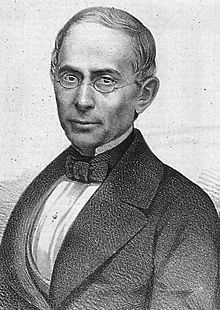Juan Eugenio Hartzenbusch
Juan Eugenio Hartzenbusch (born September 6, 1806 in Madrid ; † August 3, 1880 there ) was a Spanish poet .
biography
Juan Eugenio Hartzenbusch, son of a German carpenter from Schwadorf (now the city of Brühl) , who married a Spaniard there, studied theology, French and Italian at the University of Madrid since 1815 and wrote sonnets and romances on the side until he had a dramatic performance, which he saw for the first time around this time, added to the stage poetry.
To earn money, however, he had to take over his father's profession. He later worked as a journalist and translator for Voltaire and Vittorio Alfieri and he also edited Calderón and Rojas Zorrilla . Hartzenbusch also had an immediate and precise knowledge of German literature.
He was now translating French plays and attempting to adapt old Spanish comedies for the stage, two of which were performed. In 1835 he was employed as a stenographer for the government newspaper. The success of his own drama, based on the folk tale of the lovers of Teruel , in January 1836 prompted him to dedicate himself exclusively to literature from now on.
He later got a job at the Royal Library in Madrid, became a member of the Real Academia Española in 1847 , Chief Justice of the Theater Council in 1852 and Director of the Spanish National Library in 1862 . He died in Madrid on August 3, 1880.
Works
- Los amantes de Teruel (Madrid 1836, 2nd ed. 1838; German by Seubert, Leipz. 1873)
- Doña Mencía (1838)
- La redoma encantada (1839)
- La visionaria (1840)
- Alfonso el casto (1841)
- El bachiller Mendarias (1842)
- La coja y el encogido (1843)
- Juan de las viñas (1844)
- Vida por honra (1854)
Most of these pieces are characterized by a vigorous imagination, powerful diction, well-sounding verse structure and a striving to be national in the choice of materials and their treatment. He was a very meticulous writer who wanted to distinguish himself through formal correctness, which is why there are several versions of his dramas that he has repeatedly refined.
Los amantes de Teruel
This four-act drama premiered on January 19, 1837 and is arguably the most widely played romantic drama in Spain. Prose and verse are mixed up and the classic three units are not respected either. It was such a huge hit that it was compared to works by Shakespeare , Schiller, and the Greek tragedy . The material goes back to a narrative motif that has been documented since the 16th century. The two main characters Diego Marsilla and Isabel de Segura, whose love remains unfulfilled because they are socially unequal (he is poor, she a noblewoman) are seen today as having equal rights with Romeo and Juliet or Tristan and Isolde. Since he is so poor, her father gives him a deadline to get some money; However, he arrives too late, Isabel is already married and even refuses him one last kiss goodbye, Diego dies of desperation. On the death bed, she then gives the corpse the longed-for kiss and dies in turn. The lovers in the hereafter unite because society did not let them come together in this world. Nevertheless, the end of the drama is much more conciliatory than, say, Don Álvaro by Ángel de Saavedra , there is also no wedding in the afterlife as with José de Espronceda . What is particularly noteworthy is the dramatic play with time that runs against the protagonist, embodied in the ringing of bells and the deadline that relentlessly passes.
Hartzenbusch also published
- Cuentos y fábulas (Madrid 1861, 2 vol.) And
- Obras de encargo (Leipzig 1864) and
- Obras escogidas (with biography, das. 1865, 2 vol .; 2nd ed. 1876).
His critical editions of the Teatro escogido de Tirso de Molina (Madrid 1839–42, 12 vols .; new edition 1848), the Comedias de Calderón (1849–51, 4 vols.), Of Juan made him familiar with the old Spanish theater Ruiz de Alarcón and the Comedias escogidas de Lope de Vega Carpio (1853 ff., 4 vol.).
He published his poems and prose essays under the title: Ensayos poéticos y artículos en prosa, literarios y de costumbres (Madrid 1843). Hartzenbusch also had an immediate and precise knowledge of German literature.
Web links
- Literature by and about Juan Eugenio Hartzenbusch in the catalog of the German National Library
| personal data | |
|---|---|
| SURNAME | Hartzenbusch, Juan Eugenio |
| BRIEF DESCRIPTION | Spanish writer |
| DATE OF BIRTH | September 6, 1806 |
| PLACE OF BIRTH | Madrid |
| DATE OF DEATH | August 3, 1880 |
| Place of death | Madrid |
